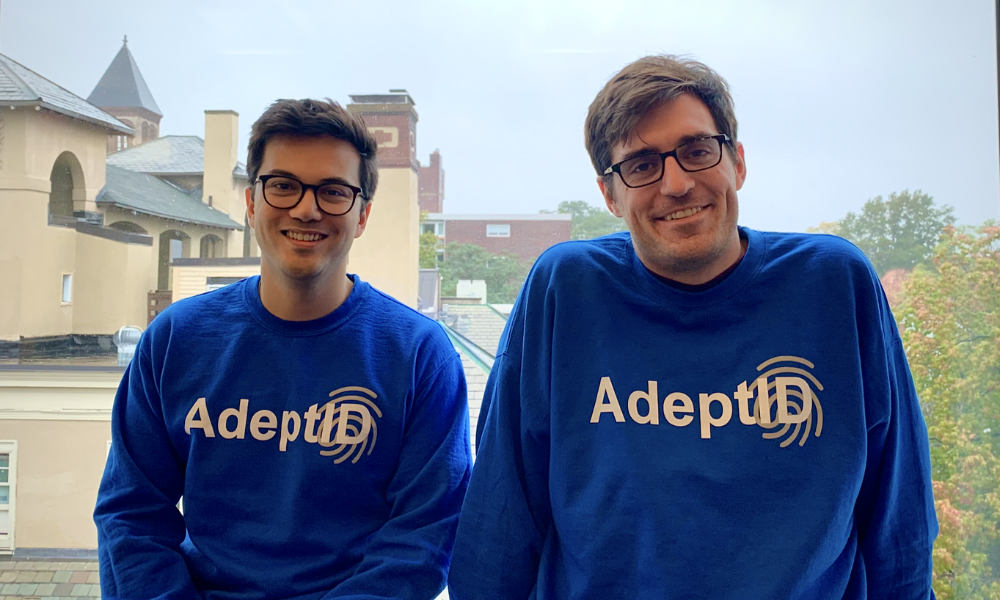
How startup leans on Netflix-like AI and machine learning to find hidden talent in the workforce

With millions of job openings vacant, employers are still struggling to fill positions after enduring months of staffing shortages.
AdeptID, a talent matching software firm, is offering a solution: expand the labor market.
Instead of limiting candidates based on their direct experience in a role or certain industry, the Boston, U.S.-based startup urges employers to consider applicants with underlying, transferable skills, particularly workers who don’t have bachelor’s degrees. AdeptID relies upon artificial intelligence, using an application programming interface (API) to find hidden talent in the workforce to recommend to employers.
“There are plenty of good jobs out there that don’t require a degree, but the methods used to identify talent are fairly superficial and certainly outdated,” Fernando Rodriguez-Villa (pictured above on the right), co-founder and CEO of AdeptID, told HRD.
According to The Boston Globe, AdeptID’s technology is similar to the software that Netflix uses to recommend movies. The machine-learning models are trained by examining past examples of career paths and applicant pools of thousands of workers. The models are then able to determine patterns, but that can present issues such as biases. For example, Rodriguez-Villa says one of the challenges facial recognition software runs into is that so many more of the examples the models are shown come from white males. Thus, the models end up being much better at identifying white males than any other race or gender.
“It’s not a surprise that a lot of algorithms are racist or have other forms of prejudice when not a lot of attention was paid to the quality of training data,” Rodriguez-Villa says. “AdeptID wants to be the vanguard of this next generation of AI-driven companies that are incredibly intentional about the susceptibility of bias in the models.”
More than a dozen of the world’s largest employers agree that bias is a major issue when it comes to algorithms for recruitment, prospecting and hiring purposes. Earlier this month, the Data & Trust Alliance formed to focus on responsible data and AI practices. Members include Walmart, Meta (formerly known as Facebook), IBM, American Express, CVS Health, General Motors, Humana, Mastercard, Nielsen, Nike, Under Armour, Deloitte and Diveplane. Collectively, they employ more than 3.7 million people, according to a press release.
Read more: BLM, ‘bro’ cultures and non-binary: How diversity changed in 2021
The Alliance plans to adopt criteria to mitigate data and algorithmic bias in human resources and workforce decisions, including recruiting, compensation and employee development. Safeguards include 55 questions in 13 categories that can be adapted by companies to evaluate vendors on criteria, including training data and model design, bias testing methods, bias remediation, transparency, accountability and AI ethics and diversity commitments.
“As businesses transition from ‘going digital’ to becoming ‘data enterprises,’ it’s imperative to unlock the value of data and AI in ways that earn trust with every stakeholder,” Doug McMillon, president and CEO of Walmart, said in a press release. “Developed and used responsibly, these systems hold the promise of making our workforces more diverse, more inclusive and ultimately more innovative.”
Of course, Rodriguez-Villa knows all about innovation. He and AdeptID co-founder Brian DeAngelis (pictured above on the left) met at Boston-based agriculture tech startup Indigo Ag. In 2018, that company acquired Rodriguez-Villa’s previous startup, TellusLabs, which used satellite imagery to monitor the world’s croplands.
Since launching last year, AdeptID has already licensed its AI models to workforce development organization YearUp, career development nonprofit Generation USA and renewable energy corporation Enel Green Power. Last week, the company announced a partnership with London-based Multiverse, which teams with Big Tech companies like Microsoft and Meta to train workers via apprenticeships. Surpassing $1 million in revenue in 12 months, AdeptID recently raised $3.5 million in seed funding to accelerate software development and scale distribution through its API partners.
“Machine learning alone isn’t going to solve the talent shortage problem,” Rodriguez-Villa says. “There needs to be a collaboration with great training providers and mission-aligned employers willing to think differently about degree requirements. I predict that 2022 is the year you separate the wheat from the chaff when it comes to employers talking about skill-based hiring.”
AdeptID is particularly focused on industries in desperate need of workers, like renewable energy, IT, advanced manufacturing and healthcare. Considering that some of these positions, like wind turbine technician, are relatively new, it’s a daunting task to find talent with previous experience. However, if you look for potential employees with transferrable skills and experience, albeit in different fields, a lot more people become eligible.
“One of the shortfalls is employers only looking at past experience as a job title,” Rodriguez-Villa says. “If someone was a cashier, for example, they might be discarded as a candidate. But they probably have attention to detail, customer service skills and an ability to handle stressful situations. I don’t know if you’ve been to a Dunkin’ Donuts in the Boston area at 7 a.m., but it’s certainly a high-stakes environment!”
As the Great Resignation continues, employers are racking their brains and emptying their coffers to create all kinds of incentives for recruits. Perhaps they should follow a different strategy, one that requires a long-term investment with potentially enormous ROI. Instead of offering luxurious perks and benefits to disgruntled veterans, why not just give newcomers an opportunity? After all, you have to go deeper than a resume if you want top-notch talent.
“The best HR directors have learned how to do this over a long career,” Rodriguez-Villa says. “We’re trying to take those insights that the best HR and talent professionals have picked up and make them available to more companies today.”